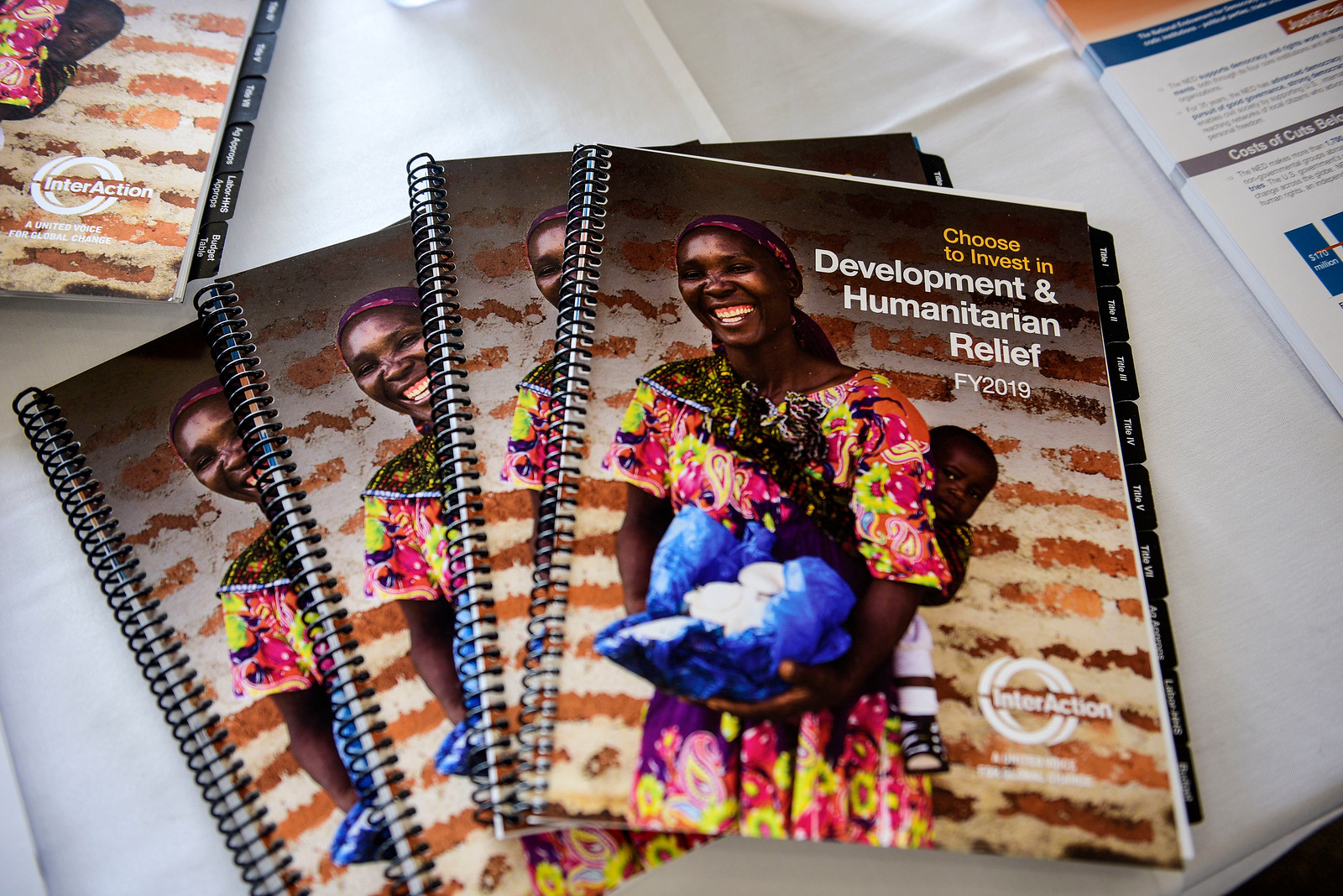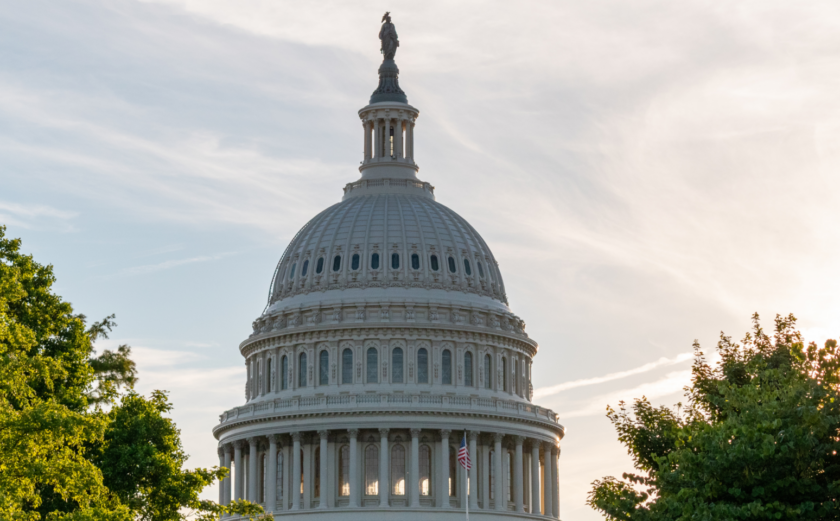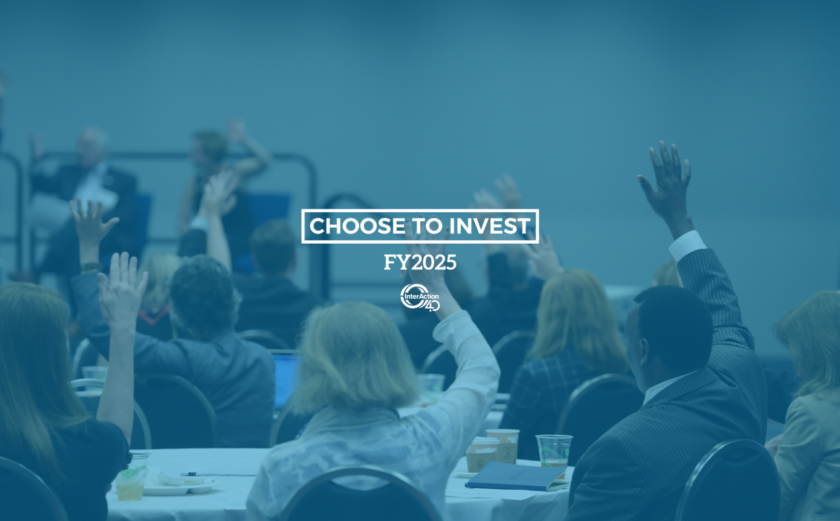
InterAction Launches Choose to Invest FY2019 with Bipartisan Support
Choose to Invest is a statement of the NGO community’s values and commitment to our shared work, President of InterAction Lindsay Coates noted, urging Congress to fund the U.S. foreign assistance budget at no less than $59.1 billion.
For the last 50 years, U.S. leadership and investment in international development and humanitarian assistance have proved instrumental in helping create more self-reliant and sustainable communities around the world. U.S. -funded development and humanitarian programs have helped reduce the number of households suffering from hunger, the number of preventable child deaths and the number of new cases of HIV. Such efforts are emblematic of American values and generosity and prove that American engagement in the world is critical.
However, a rise in famine, conflict and humanitarian crises threatens the progress that has been made thus far. Now, more than ever, American leadership and financial investment in the global arena is needed.
On April 11, 2018, InterAction launched its fiscal year 2019 Choose to Invest, an annual publication that provides reasonable funding recommendations and justifications for key international affairs programs. The publication is a resource for congressional staff and external advocates to support the appropriations process for the U.S. foreign assistance budget. Building on the expertise of InterAction’s 190+ NGO members, Choose to Invest outlines the minimum funding requirements to build on America’s commitment to life-saving and life-changing programs and maintain the United States’ position as a global leader.

To coincide with the publication’s launch, InterAction organized a reception on Capitol Hill where members of Congress and their staff learned how foreign assistance funding impacts people around the world. The reception, co-hosted by Senator Todd Young (R-IN) and Senator Jeanne Shaheen (D-NH), featured remarks from Senator Young, Nancy Wilson, CEO of Relief International, Tom Staal, USAID counselor, Sam Worthington, CEO of Interaction, and Lindsay Coates, President of InterAction.

Worthington gave opening remarks, thanking congressional advocates and the broader NGO community for supporting foreign assistance while highlighting the need to ensure funding for poverty-focused accounts don’t come at the expense of other global development and humanitarian assistance programs.

Senator Young underscored the importance of bipartisan support for effective U.S. foreign assistance and pledged to serve as an advocate within Congress to remove impediments. He also emphasized the critical role of foreign assistance in ensuring U.S. national security, continued U.S. global leadership, and the preservation of American values.
Beyond the Numbers
While Choose To Invest provides a snapshot of the impact of foreign assistance, it is the specific examples from the field that help articulate the profound impact foreign assistance has on countless individuals. Nancy Wilson shared several stories of the life-saving work being done around the world made possible by U.S. funded programs.

In Darfur, with support from USAID’s Office of Foreign Disaster Assistance (OFDA), Relief International worked directly with local communities to design latrines with locally procured materials in an internally displaced persons (IDP) camp that houses over 130,000 people. These latrines help address challenges to hygiene that prevent diarrheal disease that kill thousands of children each year.
Wilson also highlighted Relief International’s work in Bangladesh. Since August 2017, 700,000 Rohingya Muslims have fled into Bangladesh from Burma in what Wilson described as the “largest and fastest movement of people we’ve ever seen.” U.S. foreign assistance is providing Relief International with financial support through multilateral institutions to engage 8,000 children every day in child-friendly spaces and to provide 10,000 more with home visits. These stories are indicative of the critical work being done by NGOs thanks in large part to U.S. foreign assistance. As Wilson pointed out, foreign assistance funding allows NGOs to provide low-cost, measurable, and agile assistance to communities in need, particularly through locally-informed solutions.
To better support this kind of work, USAID is currently undergoing a redesign to modernize and strengthen the agency to achieve greater development outcomes and support for partner countries on their journeys to self-reliance. These redesign efforts, Counselor Staal explained, will be a “transformation” of the structure and focus of the agency to make the work more effective, efficient, and responsive to the needs in-country and to U.S. taxpayers, and will involve consultation with the NGO community throughout the process.
Counselor Staal also discussed the value of USAID’s partnership with the NGO community, describing it as a good investment of U.S. taxpayer funds. He also highlighted the contributions of the NGO community in building the capacity of in-country partners at all levels. He commended InterAction for its work, saying Choose to Invest is a great resource to monitor the success of development programs.







